Unit 3 Could you please tell me where the restrooms are Section B(2a-Self Check) 原创教学课件(共33张PPT)
文档属性
| 名称 | Unit 3 Could you please tell me where the restrooms are Section B(2a-Self Check) 原创教学课件(共33张PPT) | 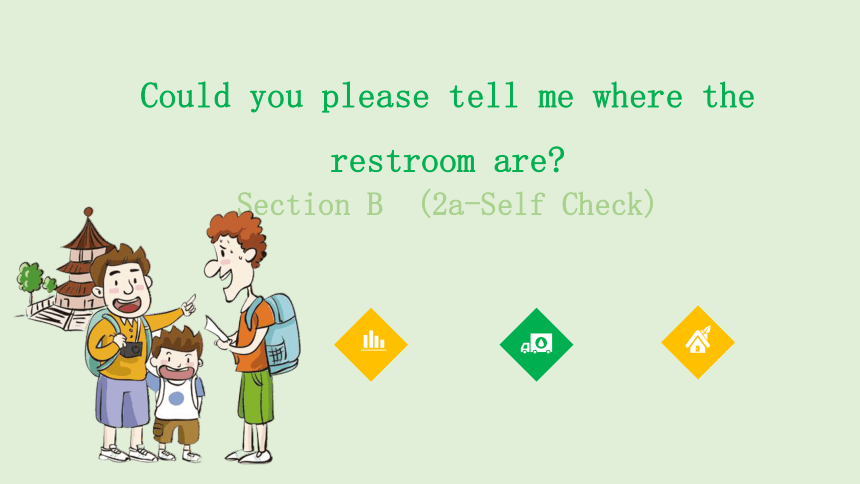 | |
| 格式 | pptx | ||
| 文件大小 | 17.8MB | ||
| 资源类型 | 试卷 | ||
| 版本资源 | 人教新目标(Go for it)版 | ||
| 科目 | 英语 | ||
| 更新时间 | 2022-10-18 19:35:06 | ||
图片预览

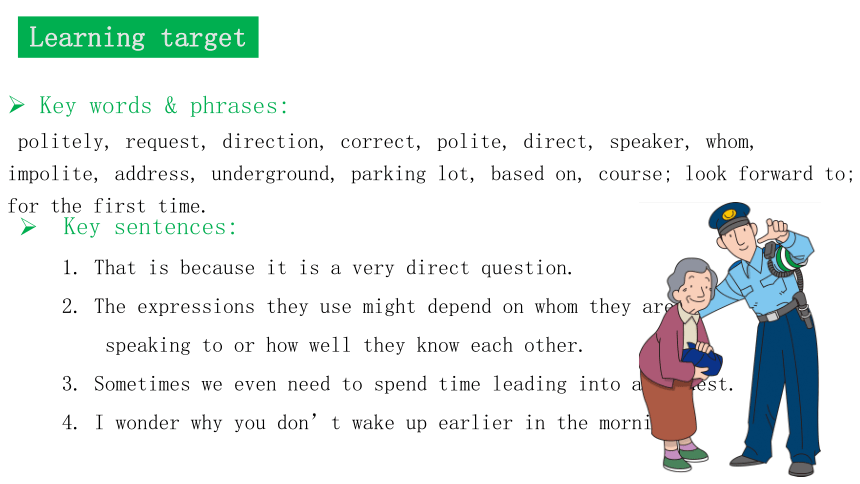
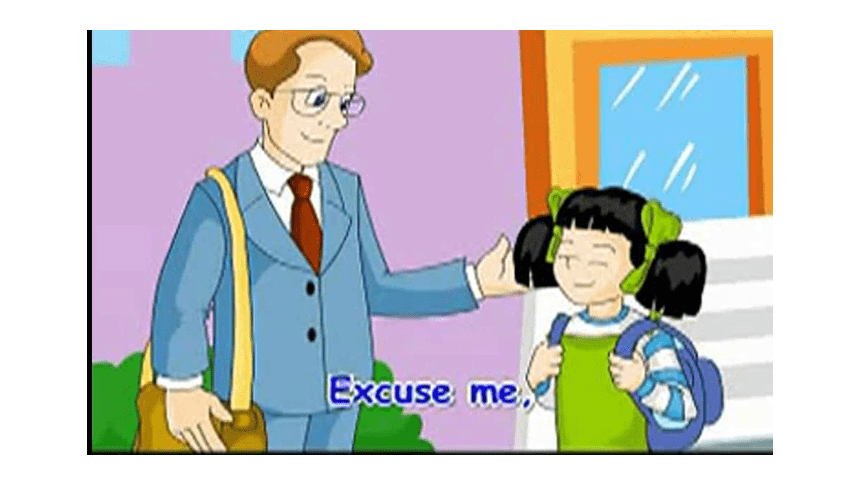
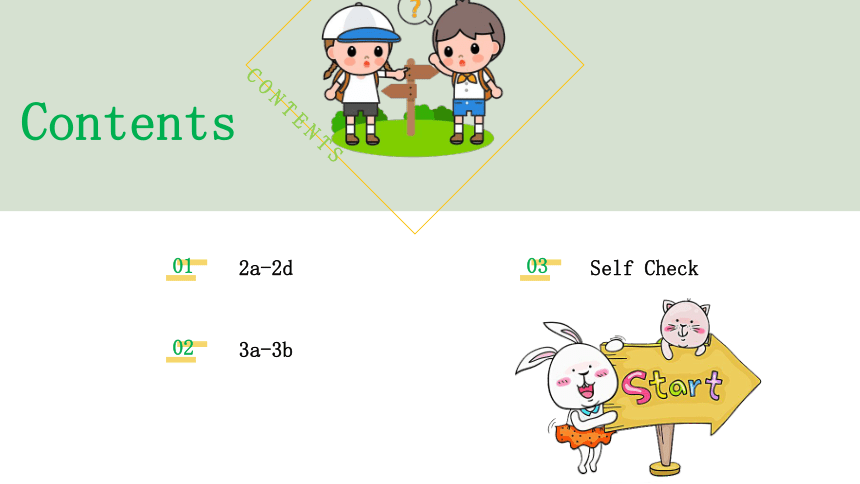
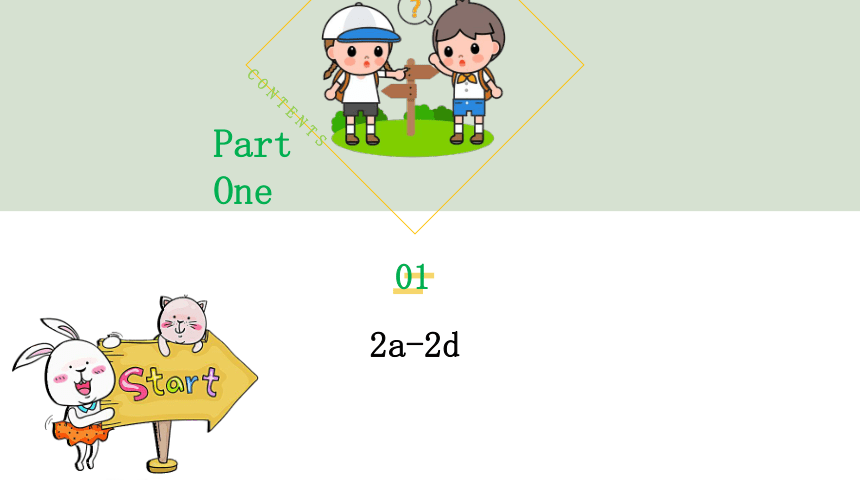
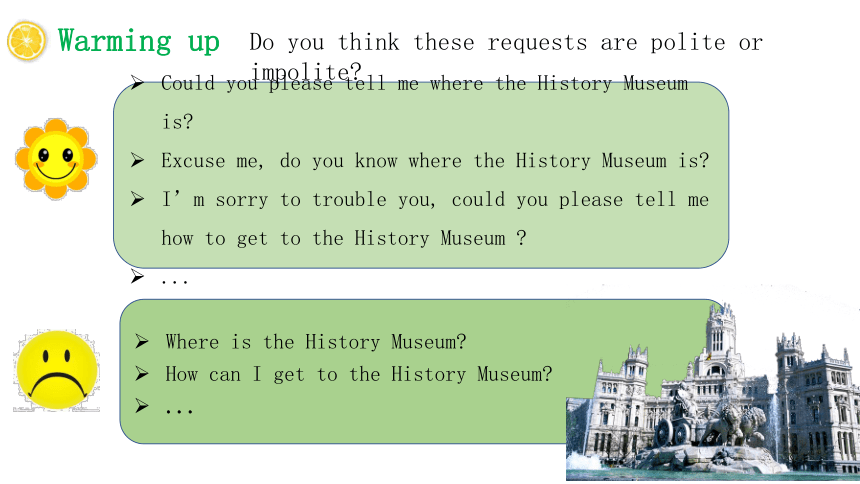
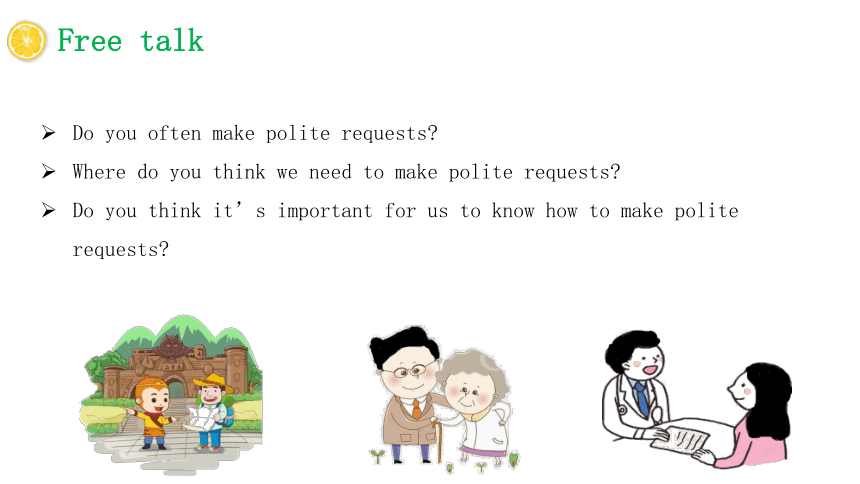
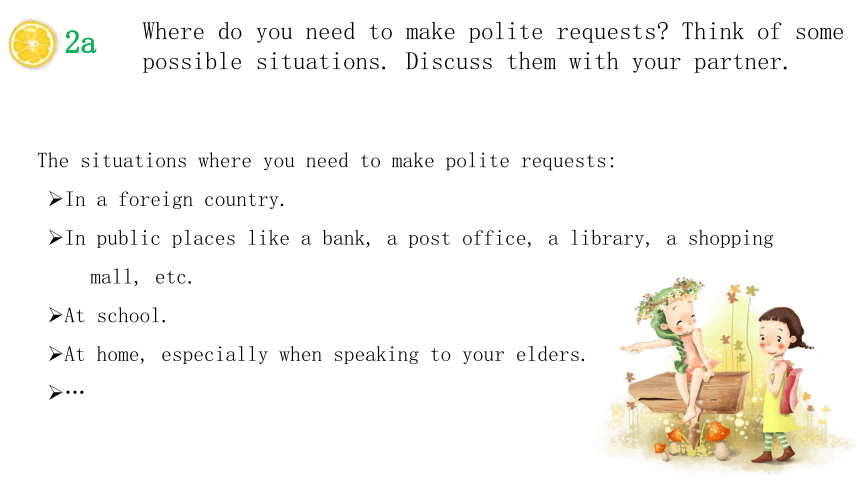
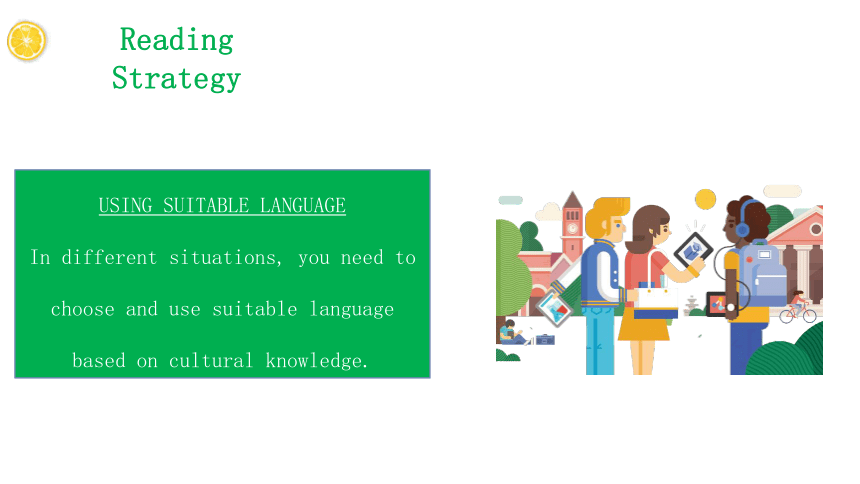
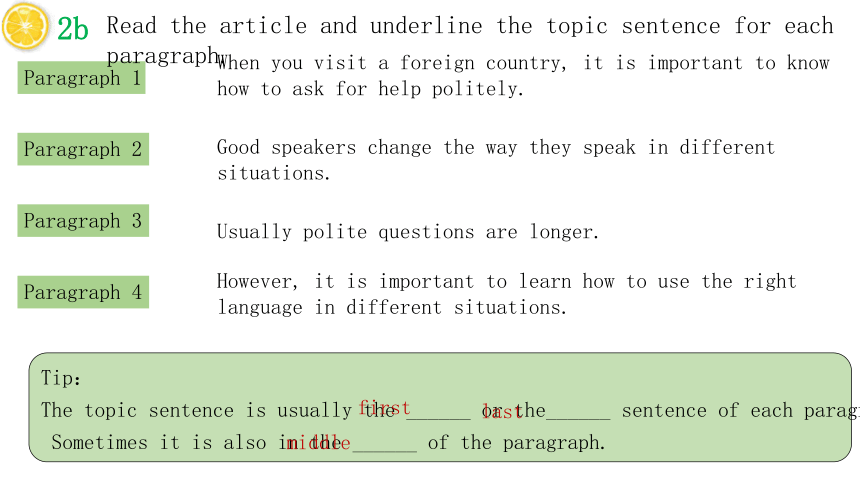
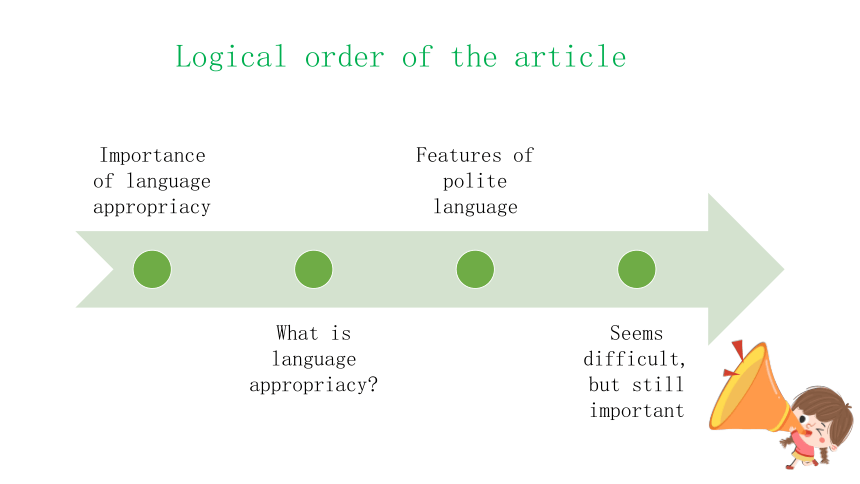
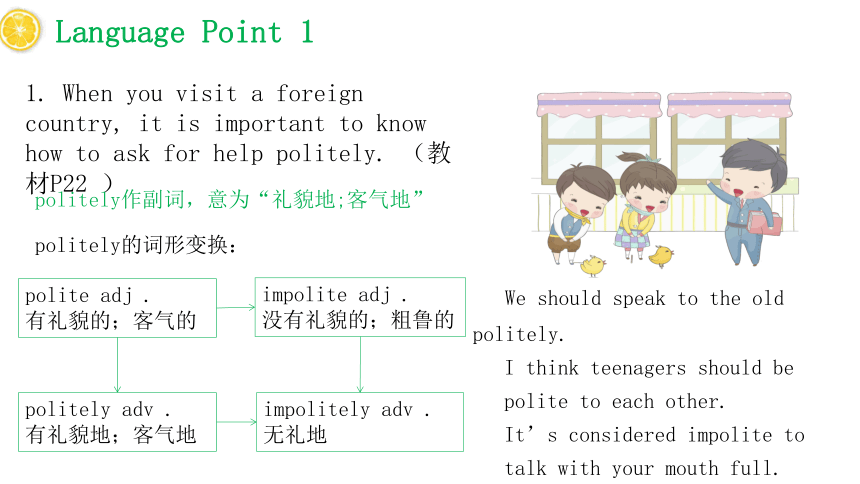
文档简介
(共33张PPT)
Could you please tell me where the restroom are
Section B (2a-Self Check)
Key words & phrases:
politely, request, direction, correct, polite, direct, speaker, whom, impolite, address, underground, parking lot, based on, course; look forward to; for the first time.
Learning target
Key sentences:
1. That is because it is a very direct question.
2. The expressions they use might depend on whom they are
speaking to or how well they know each other.
3. Sometimes we even need to spend time leading into a request.
4. I wonder why you don’t wake up earlier in the morning.
01
02
03
Self Check
2a-2d
3a-3b
Contents
CONTENTS
01
2a-2d
Part
One
CONTENTS
Could you please tell me where the History Museum is
Excuse me, do you know where the History Museum is
I’m sorry to trouble you, could you please tell me how to get to the History Museum
...
Do you think these requests are polite or impolite
Warming up
Where is the History Museum
How can I get to the History Museum
...
Do you often make polite requests
Where do you think we need to make polite requests
Do you think it’s important for us to know how to make polite requests
Free talk
Where do you need to make polite requests Think of some possible situations. Discuss them with your partner.
The situations where you need to make polite requests:
In a foreign country.
In public places like a bank, a post office, a library, a shopping
mall, etc.
At school.
At home, especially when speaking to your elders.
…
2a
USING SUITABLE LANGUAGE
In different situations, you need to choose and use suitable language based on cultural knowledge.
Reading Strategy
Good speakers change the way they speak in different situations.
When you visit a foreign country, it is important to know how to ask for help politely.
Paragraph 1
Paragraph 2
Paragraph 3
Usually polite questions are longer.
However, it is important to learn how to use the right language in different situations.
Paragraph 4
Tip:
The topic sentence is usually the ______ or the______ sentence of each paragraph.
Sometimes it is also in the ______ of the paragraph.
first
last
middle
Read the article and underline the topic sentence for each paragraph.
2b
Logical order of the article
1. When you visit a foreign country, it is important to know how to ask for help politely. (教材P22 )
politely的词形变换:
impolite adj .
没有礼貌的;粗鲁的
polite adj .
有礼貌的;客气的
politely adv .
有礼貌地;客气地
impolitely adv .
无礼地
politely作副词,意为“礼貌地;客气地”
Language Point 1
We should speak to the old politely.
I think teenagers should be polite to each other.
It’s considered impolite to talk with your mouth full.
request
名词
2. These are similar requests for directions.(教材P22 )
We must make a request for help. 我们必须请求帮助。
Language Point 2
(1)request 在本句中是可数名词,意为“要求;请求”,其后常接“for +名间”,意为“……的要求/请求”。
request
动词
①request sth. ( from/of sb.) 意为“(向某人)请求某物”。
He requested some hot water from me.
②request sb. to do sth. 意为“请求某人做某事”。
They requested him to leave at once.
③request + that从句(从句用虚拟语气,谓语动词用“ should +动词原形 should可省略)意为“请求/要求……”。
I requested that she should come an hour earlier.
because it is a very direct question此处作is 的表语,是表语从句。
Language Point 3
3. That is because it is a very direct question. (教材P22 )
The trouble is that I have lost his address.问题是我把他的地址丢了。
direct此处用作形容词,意为“直接的;直率的”,其反义词为indirect,意为“间接的”副词为directly,意为“直接地”。
You'll have to get used to his direct manner.你得慢慢习惯他这种直率的方式。
direct 还可作动词,意为“指引;指导”。
Mr Wang directs our study. 王老师指导我们的学习。
4. They include expressions such as “Could you please ... ” or “May I ask ... ”(教材P22 )
Language Point 4
作及物动词,“包括;包含”
include
The price includes both the house and the furniture inside.
作介词,“包括;包含在内”,后接名词、代词或动词-ing形式。
including
Six people, including a baby,
were injured in the accident.
作形容词,“包括在内的”,通常置于名词之后。
included
There are 100 people in this
school, 20 teachers included.
Find the direct questions and polite requests from the passage.
Direct questions Polite requests
1. 1.
2. 2.
3. 3.
4.
Where are the restrooms
When is the school trip
Where’s the post office
Could you please tell me where the restrooms are
Excuse me, Mr. West. Do you know when the school trip is
Peter, could you please tell me your e-mail address
Pardon me, could you please tell me where to park my car
2c
Read the requests below. In the second column, write A if you would say it to someone you know and B if you would say it to a stranger. In the last column, write where you think the people are talking.
2d
Request Person Place
1.Will you pass the salt
2. Do you know where I can change some money, please
3. Could you tell me what just happened
4. Can you please tell me where the nearest station is
5. Excuse me, do you know what time it begins, please
6.Let me know when you’re ready, OK
7.Could you possibly tell me the way to the village school
A
restaurant/home
B
street
any public place/home
A/B
B
street
B
movie theatre/center hall
A
home
B
street
02
3a-3b
Part
Two
CONTENTS
Imagine you are going on a short study vacation at a school in an English-speaking country. What would you like to know before you go Write some polite, indirect questions about the following topics.
Topic Question
The course you will study
The time of the course
Where and what you can eat
Where you will stay
What activities you can do
Travel to the school
Other
3a
Excuse me, can you tell me what course I will study
Pardon me, could you please tell me when the course will start
Excuse me, would you mind telling me where and what I can eat
Excuse me, do you know where I will stay
Excuse me, can you tell me what activities I can do
Pardon me, could you please tell me how to get to school
Could you please tell me what course I will study
You will study spoken English.
Can you tell me when the course will start
Next week.
Pair work
And do you know where I will stay
En! You will eat in your host family. Of course, it’s not Chinese food.
Ok! Would you mind telling me what and where I can eat
Your host family, too.
Great! So can you tell me what activities I can do
You can visit some places of interest in our country. You can also play with us.
Ok! Could you please tell me how to get to school
Take No. 11 bus.
Write a polite letter to the school asking for the information you want to know. Use your notes in 3a.
In your letter you should:
Dear …,
introduce yourself
say when you are coming
politely ask for information
thank the person for helping you
…
3b
Use the following expressions to help you:
My name is ... and I am from …
I’ll be coming to your school for ...
I’d like to know about ...
I would like to thank you for ...
I’m looking forward to your reply.
Dear Sir/Madam,
My name is Li Jie and I’m from Beijing, China. I’ll be coming to your school for a short study vacation this year. I’d like to know more about your school and the course I would like to take.
First, I would like to find out exactly how long the course is and when it will begin. I wonder if you could send me the course online and some information about the course fees.
Could you please also send me some information about student housing and transport to your school In addition, it would be interesting for me to know about the activities that students can take part in and the places where they can hang out and have their meals after school.
I would like to thank you for your help and I’m looking forward to your reply.
Yours faithfully,
Li Jie
Sample Writing
03
Self Check
Part
Three
CONTENTS
1. Fill in the blanks with the words in the box.
corner direct polite rush suggest plan
1. A: Could you tell me where the library is
B: It’s on the ______ of Main and Center Streets.
2. A: I wonder why you don’t wake up earlier in the morning. You’re always in a _____
to get to school on time.
B: Yes, you’re right. I need to ________ my time better.
corner
rush
plan
Self Check
3. A: I want to buy some winter clothes. Could you tell me which place would be a good
choice for me to go to
B: I _______ Jenny’s Clothes Store in Century Shopping Mall. It’s convenient to get to.
4. In many countries, it is often not ________ to ask very _________ questions when you
meet someone for the first time.
suggest
polite
direct
2. Write questions and answers using the words given.
1. buy a magazine / bookstore on the third floor
Q: _________________________________________________
A: _________________________________________________
2. get some stamps / post office on Green Street
Q: __________________________________________________
A: __________________________________________________
Do you know where I can get some stamps
You can get them at the post office on Green Street.
Could you please tell me where I can buy a magazine
There’s a bookstore on the third floor.
3. shopping center opens / 10:00 a.m.
Q: _________________________________________________
A: _________________________________________________
4. get to the Japanese restaurant / go along Main Street and turn right on Lake Street
Q: __________________________________________________
A: __________________________________________________
Could you tell me what time the shopping center opens
It opens at 10:00 a.m..
May I ask how to get to the Japanese restaurant
Just go along Main Street and turn right on Lake street.
一、单项选择。
1. — Sam, can you tell me ________ — Music World on Huangyuan Street.
A. why to buy a CD B. where to get a CD
C. how to choose a CD D. when to record a CD
2. — What do you think of Mary
— She is a good girl. She always answers the phone _____ when I call her.
A. politely B. suddenly C. easily D. luckily
B
A
3. — Why do you look unhappy
— Because Susan didn’t say hello to me when she _______.
A. waited for B. passed by C. gave up D. put on
4. I’m really __________ you at the next gathering!
A. look forward to see B. look forward to seeing
C. looking forward to see D. looking forward to seeing
B
D
Exercises
1. Ask and show the way.
Summary
2. Learn to write a letter to
ask for information politely
you want to know.
Next
U4 I used to be afraid of the dark.
Section A (1a-2d)
Could you please tell me where the restroom are
Section B (2a-Self Check)
Key words & phrases:
politely, request, direction, correct, polite, direct, speaker, whom, impolite, address, underground, parking lot, based on, course; look forward to; for the first time.
Learning target
Key sentences:
1. That is because it is a very direct question.
2. The expressions they use might depend on whom they are
speaking to or how well they know each other.
3. Sometimes we even need to spend time leading into a request.
4. I wonder why you don’t wake up earlier in the morning.
01
02
03
Self Check
2a-2d
3a-3b
Contents
CONTENTS
01
2a-2d
Part
One
CONTENTS
Could you please tell me where the History Museum is
Excuse me, do you know where the History Museum is
I’m sorry to trouble you, could you please tell me how to get to the History Museum
...
Do you think these requests are polite or impolite
Warming up
Where is the History Museum
How can I get to the History Museum
...
Do you often make polite requests
Where do you think we need to make polite requests
Do you think it’s important for us to know how to make polite requests
Free talk
Where do you need to make polite requests Think of some possible situations. Discuss them with your partner.
The situations where you need to make polite requests:
In a foreign country.
In public places like a bank, a post office, a library, a shopping
mall, etc.
At school.
At home, especially when speaking to your elders.
…
2a
USING SUITABLE LANGUAGE
In different situations, you need to choose and use suitable language based on cultural knowledge.
Reading Strategy
Good speakers change the way they speak in different situations.
When you visit a foreign country, it is important to know how to ask for help politely.
Paragraph 1
Paragraph 2
Paragraph 3
Usually polite questions are longer.
However, it is important to learn how to use the right language in different situations.
Paragraph 4
Tip:
The topic sentence is usually the ______ or the______ sentence of each paragraph.
Sometimes it is also in the ______ of the paragraph.
first
last
middle
Read the article and underline the topic sentence for each paragraph.
2b
Logical order of the article
1. When you visit a foreign country, it is important to know how to ask for help politely. (教材P22 )
politely的词形变换:
impolite adj .
没有礼貌的;粗鲁的
polite adj .
有礼貌的;客气的
politely adv .
有礼貌地;客气地
impolitely adv .
无礼地
politely作副词,意为“礼貌地;客气地”
Language Point 1
We should speak to the old politely.
I think teenagers should be polite to each other.
It’s considered impolite to talk with your mouth full.
request
名词
2. These are similar requests for directions.(教材P22 )
We must make a request for help. 我们必须请求帮助。
Language Point 2
(1)request 在本句中是可数名词,意为“要求;请求”,其后常接“for +名间”,意为“……的要求/请求”。
request
动词
①request sth. ( from/of sb.) 意为“(向某人)请求某物”。
He requested some hot water from me.
②request sb. to do sth. 意为“请求某人做某事”。
They requested him to leave at once.
③request + that从句(从句用虚拟语气,谓语动词用“ should +动词原形 should可省略)意为“请求/要求……”。
I requested that she should come an hour earlier.
because it is a very direct question此处作is 的表语,是表语从句。
Language Point 3
3. That is because it is a very direct question. (教材P22 )
The trouble is that I have lost his address.问题是我把他的地址丢了。
direct此处用作形容词,意为“直接的;直率的”,其反义词为indirect,意为“间接的”副词为directly,意为“直接地”。
You'll have to get used to his direct manner.你得慢慢习惯他这种直率的方式。
direct 还可作动词,意为“指引;指导”。
Mr Wang directs our study. 王老师指导我们的学习。
4. They include expressions such as “Could you please ... ” or “May I ask ... ”(教材P22 )
Language Point 4
作及物动词,“包括;包含”
include
The price includes both the house and the furniture inside.
作介词,“包括;包含在内”,后接名词、代词或动词-ing形式。
including
Six people, including a baby,
were injured in the accident.
作形容词,“包括在内的”,通常置于名词之后。
included
There are 100 people in this
school, 20 teachers included.
Find the direct questions and polite requests from the passage.
Direct questions Polite requests
1. 1.
2. 2.
3. 3.
4.
Where are the restrooms
When is the school trip
Where’s the post office
Could you please tell me where the restrooms are
Excuse me, Mr. West. Do you know when the school trip is
Peter, could you please tell me your e-mail address
Pardon me, could you please tell me where to park my car
2c
Read the requests below. In the second column, write A if you would say it to someone you know and B if you would say it to a stranger. In the last column, write where you think the people are talking.
2d
Request Person Place
1.Will you pass the salt
2. Do you know where I can change some money, please
3. Could you tell me what just happened
4. Can you please tell me where the nearest station is
5. Excuse me, do you know what time it begins, please
6.Let me know when you’re ready, OK
7.Could you possibly tell me the way to the village school
A
restaurant/home
B
street
any public place/home
A/B
B
street
B
movie theatre/center hall
A
home
B
street
02
3a-3b
Part
Two
CONTENTS
Imagine you are going on a short study vacation at a school in an English-speaking country. What would you like to know before you go Write some polite, indirect questions about the following topics.
Topic Question
The course you will study
The time of the course
Where and what you can eat
Where you will stay
What activities you can do
Travel to the school
Other
3a
Excuse me, can you tell me what course I will study
Pardon me, could you please tell me when the course will start
Excuse me, would you mind telling me where and what I can eat
Excuse me, do you know where I will stay
Excuse me, can you tell me what activities I can do
Pardon me, could you please tell me how to get to school
Could you please tell me what course I will study
You will study spoken English.
Can you tell me when the course will start
Next week.
Pair work
And do you know where I will stay
En! You will eat in your host family. Of course, it’s not Chinese food.
Ok! Would you mind telling me what and where I can eat
Your host family, too.
Great! So can you tell me what activities I can do
You can visit some places of interest in our country. You can also play with us.
Ok! Could you please tell me how to get to school
Take No. 11 bus.
Write a polite letter to the school asking for the information you want to know. Use your notes in 3a.
In your letter you should:
Dear …,
introduce yourself
say when you are coming
politely ask for information
thank the person for helping you
…
3b
Use the following expressions to help you:
My name is ... and I am from …
I’ll be coming to your school for ...
I’d like to know about ...
I would like to thank you for ...
I’m looking forward to your reply.
Dear Sir/Madam,
My name is Li Jie and I’m from Beijing, China. I’ll be coming to your school for a short study vacation this year. I’d like to know more about your school and the course I would like to take.
First, I would like to find out exactly how long the course is and when it will begin. I wonder if you could send me the course online and some information about the course fees.
Could you please also send me some information about student housing and transport to your school In addition, it would be interesting for me to know about the activities that students can take part in and the places where they can hang out and have their meals after school.
I would like to thank you for your help and I’m looking forward to your reply.
Yours faithfully,
Li Jie
Sample Writing
03
Self Check
Part
Three
CONTENTS
1. Fill in the blanks with the words in the box.
corner direct polite rush suggest plan
1. A: Could you tell me where the library is
B: It’s on the ______ of Main and Center Streets.
2. A: I wonder why you don’t wake up earlier in the morning. You’re always in a _____
to get to school on time.
B: Yes, you’re right. I need to ________ my time better.
corner
rush
plan
Self Check
3. A: I want to buy some winter clothes. Could you tell me which place would be a good
choice for me to go to
B: I _______ Jenny’s Clothes Store in Century Shopping Mall. It’s convenient to get to.
4. In many countries, it is often not ________ to ask very _________ questions when you
meet someone for the first time.
suggest
polite
direct
2. Write questions and answers using the words given.
1. buy a magazine / bookstore on the third floor
Q: _________________________________________________
A: _________________________________________________
2. get some stamps / post office on Green Street
Q: __________________________________________________
A: __________________________________________________
Do you know where I can get some stamps
You can get them at the post office on Green Street.
Could you please tell me where I can buy a magazine
There’s a bookstore on the third floor.
3. shopping center opens / 10:00 a.m.
Q: _________________________________________________
A: _________________________________________________
4. get to the Japanese restaurant / go along Main Street and turn right on Lake Street
Q: __________________________________________________
A: __________________________________________________
Could you tell me what time the shopping center opens
It opens at 10:00 a.m..
May I ask how to get to the Japanese restaurant
Just go along Main Street and turn right on Lake street.
一、单项选择。
1. — Sam, can you tell me ________ — Music World on Huangyuan Street.
A. why to buy a CD B. where to get a CD
C. how to choose a CD D. when to record a CD
2. — What do you think of Mary
— She is a good girl. She always answers the phone _____ when I call her.
A. politely B. suddenly C. easily D. luckily
B
A
3. — Why do you look unhappy
— Because Susan didn’t say hello to me when she _______.
A. waited for B. passed by C. gave up D. put on
4. I’m really __________ you at the next gathering!
A. look forward to see B. look forward to seeing
C. looking forward to see D. looking forward to seeing
B
D
Exercises
1. Ask and show the way.
Summary
2. Learn to write a letter to
ask for information politely
you want to know.
Next
U4 I used to be afraid of the dark.
Section A (1a-2d)
同课章节目录
- Unit 1 How can we become good learners.
- Section A
- Section B
- Unit 2 I think that mooncakes are delicious!
- Section A
- Section B
- Unit 3 Could you please tell me where the restroom
- Section A
- Section B
- Unit 4 I used to be afraid of the dark.
- Section A
- Section B
- Unit 5 What are the shirts made of?
- Section A
- Section B
- Review of Units 1-5
- Unit 6 When was it invented?
- Section A
- Section B
- Unit 7 Teenagers should be allowed to choose their
- Section A
- Section B
- Unit 8 It must belong to Carla.
- Section A
- Section B
- Unit 9 I like music that I can dance to.
- Section A
- Section B
- Unit 10 You're supposed to shake hands.
- Section A
- Section B
- Review of Units 6-10
- Unit 11 Sad movies make me cry.
- Section A
- Section B
- Unit 12 Life is full of the unexpected
- Section A
- Section B
- Unit 13 We're trying to save the earth!
- Section A
- Section B
- Unit 14 I remember meeting all of you in Grade 7.
- Section A
- Section B
- Review of Units 11-14
